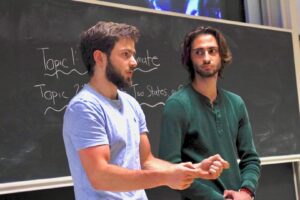AUSTIN, Texas—Morris Dees, founder and chief trial counsel of the Southern Poverty Law Center, will discuss his career as a civil rights attorney, focusing on his experience using the courts to battle the Ku Klux Klan and other hate groups, on Thursday, March 1, at The University of Texas School of Law. The talk is open to the public.
Dees’ talk, "With Justice for All," will be held in the law school’s Jeffers Courtroom at 3:30 p.m. A brief reception will follow.
The talk is presented by the School of Law’s William Wayne Justice Center for Public Interest Law and cosponsored by the Asian Law Students Association, the Chicano/Hispanic Law Students Association, the Middle Eastern Law Students’ Association, OUTLaw and the Thurgood Marshall Legal Society.
Dees was raised on a cotton farm in rural Alabama and graduated from the University of Alabama School of Law in 1960. In 1967, he filed suit to stop construction of a white university in an Alabama city that already had a predominantly black state college. He later sued to integrate the all-white Montgomery YMCA. In 1971 he founded the Southern Poverty Law Center in Montgomery, Ala., which is known for its legal victories against white supremacists, tolerance education programs and hate groups.
Last year, the University of Alabama School of Law and the law firm of Skadden, Arps, Slate, Meagher and Flom LLP and Affiliates created the Morris Dees Justice Award to honor Dees. The award is given annually to a lawyer who has devoted his or her career to serving the public interest and pursuing justice, and whose work has brought about positive change in the community, state, or nation. Judge William Wayne Justice, a 1942 graduate of the University of Texas School of Law and a U.S. district judge for the Western District of Texas, received the first award in November 2006.
"Morris Dees has been an innovative leader in the fight against hate groups for 40 years, and we are very pleased he has agreed to share his experiences with our students and faculty," said Eden Harrington, director of the School of Law’s William Wayne Justice Center. "In different ways, Morris Dees and Judge Justice have spent their careers working to ensure equal justice for all. We look forward to learning more about Mr. Dees’ groundbreaking advocacy work and celebrating Judge Justice’s receipt of the first Morris Dees Justice Award."
Dees’ successful fight against the KKK included a $7 million precedent-setting judgment on behalf of the mother of Michael Donald, a young black man lynched by the Klan in Mobile, Ala. Other victories against hate groups include a $6 million judgment that bankrupted the Aryan Nations, a $12.5 million jury verdict against the California-based White Aryan Resistance for the death of a black student and a $26 million verdict against the Carolina Klan for burning black churches.
To help educate young people about the civil rights movement, Dees developed the idea for the Civil Rights Memorial. Designed by Maya Lin, the memorial bears the names of men, women and children who lost their lives during the civil rights movement. Dees is also the author of several books, including "Hate on Trial: The Case Against America’s Most Dangerous Neo-Nazi" and "Gathering Storm: America’s Militia Threat."
For more information contact: Laura Castro, School of Law, 512-232-1229, 512-825-9525 (cell); Mary Crouter, WWJ Center, School of Law, 512-232-7855.



